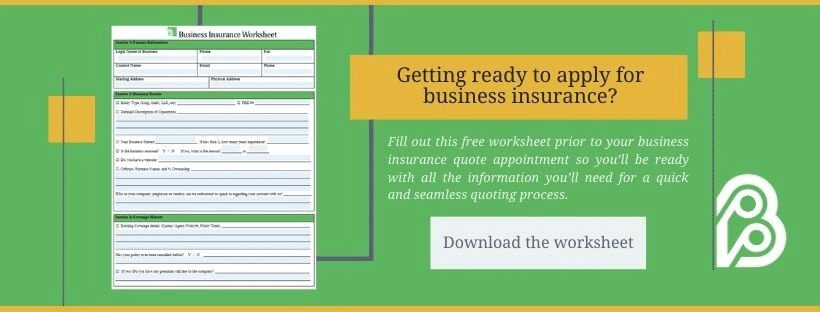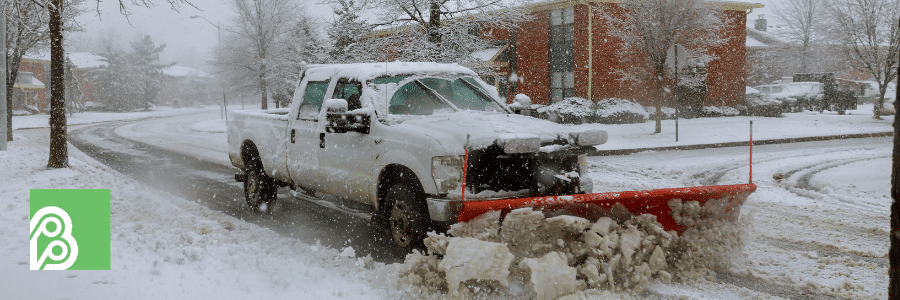Do I Need Snow Plow Insurance?
Business Insurance | General Liability | Learning Center | snow plow insurance | snow removal insurance | Business Auto
Hitch up your plows and pray to Mother Nature – it’s almost snow plowing season! Remember a few years ago when we had that freak snowstorm in October? If you’re a snow plow contractor in New England, I’m betting your fingers are crossed for a heavy winter snow season again this year.
And if that’s the case, you’re also wondering if you’ve got the right insurance in place to cover your snow plow operations.
At Berry Insurance, we’ve insured thousands of contractors over the years and have answered these questions many times. Let’s review what snow plow insurance is, what affects the cost of the insurance, and what you’ll need to know before you plow the road.
What is snow plow insurance?
A general liability policy is needed to cover your snow plow operations. This policy will cover you for any bodily injury or property damage caused by your plowing. It will also give you “completed operations coverage”, which we’ll discuss more in a minute. One thing that is important to note – you may already have a general liability policy in place for your contracting operations. Unfortunately, unless it is specifically endorsed to cover your snow plow operations, you would not automatically have coverage.
I’m thinking about snow plowing for business, am I covered?
Possibly, but most likely not. Here’s the thing. When you offer snow removal services, there are few specifics you’ll need to decide before you can find out what type of coverage you may, or may not, need. They are:
- Will you plow residential driveways, commercial properties, parking lots, residential streets/roads, or highways?
- Will you be charging for services?
- Will you provide additional snow removal services – like sidewalks, walkways, or roofs?
- Will you be sanding or providing any surface treatments?
- Do you want coverage for any damage to the plow itself?
- Will you be hiring new employees?
- Which vehicle will you be using to plow – personally owned or owned by the business?
Once you’ve ironed out the details of your snow plowing operations, by answering the questions above, you can begin to determine what type of coverage you have already, and what you may need going forward.
Let’s dive deeper into how the answers to these questions may affect the insurance coverages you’ll need.
Will you plow residential driveways, commercial properties, parking lots, residential streets/roads, or highways?
Some insurance companies are comfortable offering liability coverage to contractors who plow streets and roads, but not contractors who plow commercial parking lots. Other insurance companies prefer contractors who only plow highways. Some will allow you to do the occasional driveway for a neighbor or for your home, while others won’t cover that at all. Some insurance companies also put restrictions on the size of parking lots you can plow. It’s enough to make your head spin. And it changes each year.
In addition to this, your general liability policy may have a snow plow exclusion. Or it may have some limited coverage. It is important to identify all your potential plowing operations ahead of time so that you can be sure everything is covered before the first snowflake falls.
Note: If you will be contracted to plow for a city or town, you will likely be asked to provide a certificate of insurance, verifying that you have high limits and you may also be asked to name the city or town as an “Additional Insured”. There could be a charge for this, so be sure to find out what is required of you before you begin work for a town.
Will you be charging for services?
This may seem like a silly question – but it’s important. If you plan to just plow a few driveways to be a good neighbor, then you may have coverage under your auto policy. But if you are charging for your services, that can be considered a business exposure. If all you have is a personal auto policy, the rating would change to a “business use” rating, which would increase your policy premium.
Will you provide additional snow removal services – like sidewalks, walkways, or roofs?
Additional snow removal services typically result in additional insurance costs, especially if you are getting up on a roof. Be sure to clearly identify which, if any, additional services you plan to offer to discuss those options with your insurance agent.
Will you be sanding or providing any surface treatments?
Road treatments can be a slippery proposition (see what we did there?). If someone slips and falls after you’ve treated the area, you could be held responsible for their injuries. In addition to this, sanding typically requires specialized equipment attached to your trucks, which may need extra insurance. This brings us to the next question…
Do you want coverage for any damage to the plow itself?
If the plow is attached to your truck, and your truck has physical damage coverage (collision and comprehensive), then damage to the plow would be covered under your Massachusetts auto policy.
However, it’s on an actual cash value basis. So if you would be looking for replacement cost coverage, you’d need a separate equipment insurance policy to provide that coverage. The same would apply for any specialized equipment that you may want full replacement cost on should a claim happen.
You’ll want to provide a copy of the receipt for the plow and any additional equipment so that you can update the values on your auto policy, or to obtain the separate replacement cost equipment policy.
Will you be hiring new employees?
Many contractors will hire additional employees/drivers during the winter months to cover the various snow plowing shifts they take on. If that is something you also plan to do, you’ll want to be sure to check driving records of those new hires.
A “true and attested public driving record” copy of the individual’s Massachusetts driving record costs $20 and can be ordered right online by the potential new hire. Checking this prior to the start of employment could give you an indication of whether they will be considered an acceptable driver for insurance coverage. (Note: Applicants/Employees with several moving violations or citations may be excluded by your insurance policy.)
Which vehicle will you be using to plow – personally owned or owned by the business?
Here’s where things get interesting….and I find it best to use examples.
First and foremost, any damage to your vehicle would be covered under your auto policy – whether that is a personal policy or a commercial business policy.
- If you are plowing a street and scrape your truck/plow against some parked cars, the damage to your truck/plow is covered under your auto policy.
- If you are plowing and hit a car, the damage to that car would be covered under your auto policy.
However, what about what could happen after you’re done plowing? This is known as your “completed operations” and is only something that can be purchased on a general liability policy. Again, let’s use some examples:
- You plow a commercial parking lot and a patron slips and falls. They sue you for their injuries. Your auto policy provides coverage for damage to your vehicle, or liability for accidents involving your vehicle. Neither of these are applicable here, so you’d be left without protection.
- You plow a residential driveway for someone while they are away on vacation. You didn’t realize that some snow was piled against the side of the property and when the weather warmed up, melted and flooded the resident’s home. They want reimbursement for the damages and cleanup costs. Again, you don’t have coverage without a general liability policy.
We’ve Got You Covered
Plowing during the winter months can provide a great source of additional income – whether you’re a business or an individual. But as you can see above, it also could come at a cost, especially if left unprotected.
At Berry Insurance, we understand that the winter season is a highly profitable one for your business. We want you to keep that profit in your pockets by obtaining the proper protection and avoiding any potential claims. Give us a call today or fill out our quote form to get started on protecting your snow plow business today!
If you're going to be supplying a snow plow to a hired driver or employee, review how they will be covered by checking out this article: What You Need to Know When Supplying a Company-Owned Vehicle to an Employee.




-1.jpg)